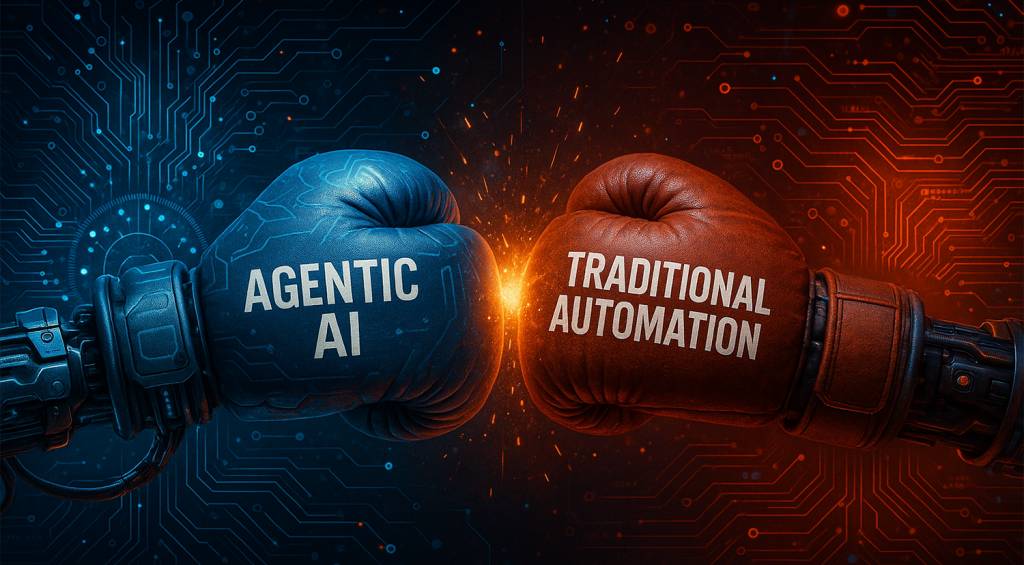AI Agents vs Traditional Automation

Every leadership team is asking the same question today – “How do we scale without adding more people?”
Most businesses have already tried traditional automation. Some succeeded. Many hit ceilings.
Processes kept changing. Systems didn’t talk to each other. Teams still chased follow-ups, answered the same questions, and moved the same data across tools.
This is where the change is needed.
Traditional automation completes tasks. AI agents finish workflows.
This article breaks down the difference between AI agents and traditional automation so you can decide what your organisation actually needs.
Traditional automation
Traditional automation runs on fixed rules.
An automated workflow is a series of defined tasks. This makes it useful for stabilised, repetitive processes. Tasks include copying data between systems, extracting fields from structured forms, and predefined routing.
Automation performs well when nothing changes. The problem is that things do change.
A slight variation, such as an unexpected email format, an alteration to an ERP field name, or a missing value, can break an automated flow. Every break sends work back to teams who have to intervene manually, fix errors, and sometimes rebuild entire workflows. The more systems a company uses, the more fragile traditional automation becomes.
This fragility is the reason many organisations quietly stop scaling their automations after a certain point. The maintenance load becomes heavier than the value.
AI Agents – Software That Understands Context and Decides
AI agents work differently.
They follow goals rather than rigid rules.
An AI agent will read text, analyse information, understand instructions, decide on the next step, and complete multi-step tasks across different systems. It behaves like a digital team member that can take a workflow from start to finish, not just handle one narrow step.
An agent doesn’t break when something changes. If there’s missing information, it seeks clarification. If a step fails, it tries an alternative path.
This flexibility is what makes AI agents suitable for modern business operations, where variation is the norm rather than the exception.
Direct Comparison between AI Agents vs Traditional Automation
| Criteria | Traditional Automation | AI Agents |
| Adaptability | Works only when rules stay the same | Adjusts to variations and exceptions |
| Data Handling | Structured data only | Structured + unstructured data |
| Complexity of Tasks | Simple, repetitive | Multi-step, judgment-based |
| Exception Handling | Breaks when flow changes | Understands context and chooses next step |
| Maintenance | High, requires IT involvement | Lower, improves over time |
| Use Cases | Data entry, routing, fixed logic processes | Approvals, coordination, decision-making, communications |
Should you go for AI Agents or stick to traditional automation?
Ask these questions:
- Does the process change often?
- Does it require interpretation or judgment?
- Does it involve unstructured data like PDFs, emails, or chats?
- Does it span across multiple systems?
- Does it have frequent exceptions?
- Do teams waste time coordinating or following up?
If the answer is yes to most of these, AI agents will deliver better value and more resilience.
If the process is stable, structured and repetitive, traditional automation remains a sufficient and cost-effective solution.
Many organisations end up using a hybrid approach. Automation handles repetitive tasks in the background, while AI agents manage decisions, exceptions, and multi-step flows around it.
The Impact on Employees
What does this mean for employees? Where entry level jobs used to be about training on task completion, they now involve orchestrating multiple tasks. People become responsible for outcomes from a process rather than a single step within it.
Established employees understand how processes work. They will, however, need training on using AI and agents. This protects the specific knowledge they have of how a company works from being lost.
The direction is clear:
- Data won’t remain structured.
- Workflows won’t remain stable.
Which means:
- Untrained teams won’t keep up with the constant information flow.
- Companies with adaptable workflows will outperform those with rigid ones.
AI agents are becoming the orchestration layer that ties systems, information and decisions together. They deliver faster operations, fewer bottlenecks and clearer decisions.
If your organisation is hitting maintenance issues, speed limitations, or unnecessary complexity because of automation, it’s a signal that your workflows have outgrown fixed rules.
AI agents provide the flexibility and intelligence necessary to transition from task-level automation to end-to-end operational flow.
This is how businesses scale without increasing headcount.
Explore What AI Agents Can Do for Your Business
At MSBC Group, we work with businesses to:
- Identify workflows where AI agents deliver immediate ROI
- Build agents that work across CRMs, ERPs, email, chat, and internal tools
- Reduce operational workload and repetitive decision cycles
- Improve reporting, speed, and accuracy across teams
- Deliver measurable results in weeks.
If you want a free process assessment to see where AI agents can save time and improve performance inside your organisation, we’re happy to help.
Start the conversation today. It usually takes one short call to reveal opportunities worth acting on.
